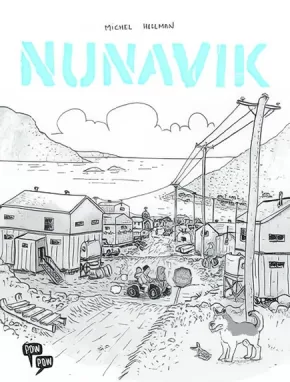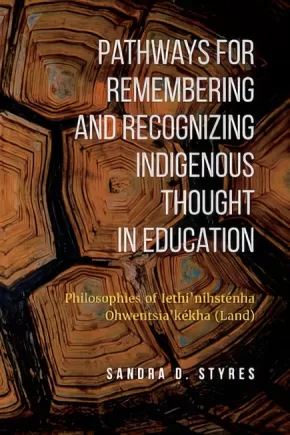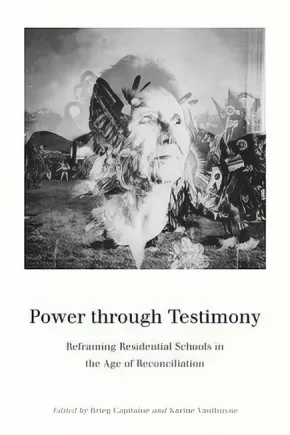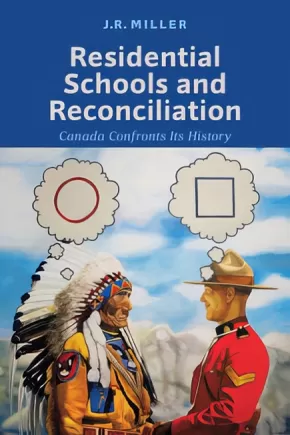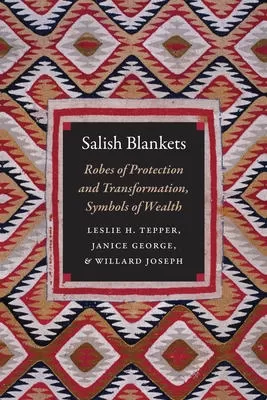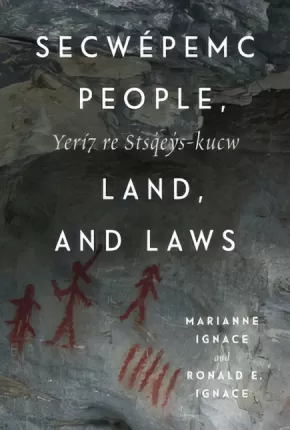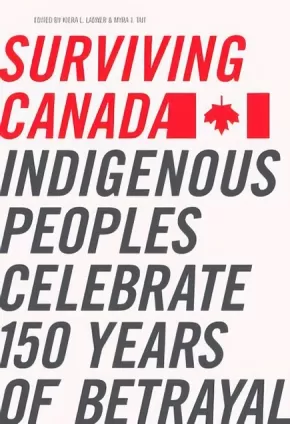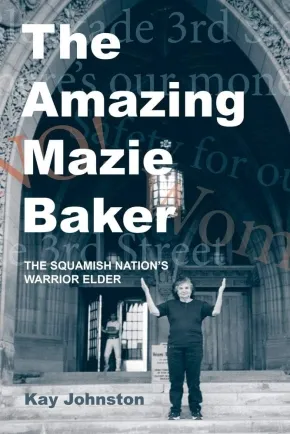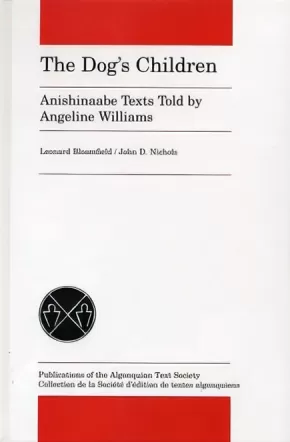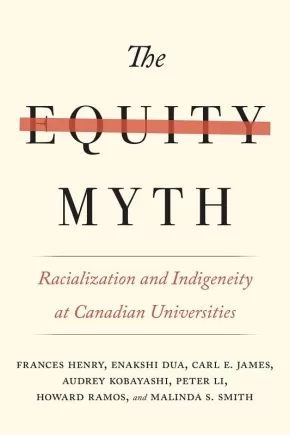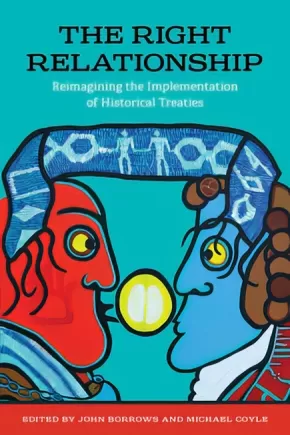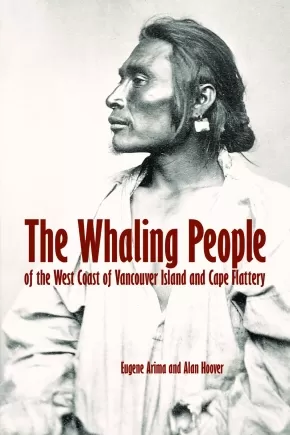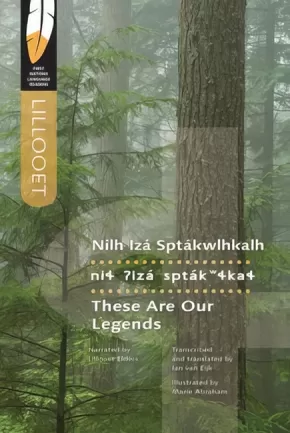
Indigenous Studies
811
-
825
of
1030 Results;
Sort By
Go To
of 69
Nunavik (7 in Stock)
$22.95
Format:
Paperback
Text Content Territories:
Indigenous Canadian; Inuit;
Grade Levels: 12; University/College;
ISBN / Barcode: 9782924049358
Synopsis:
Synopsis:
Author Michel Hellman meets with his editor Luc Bossé and casually promises to write a sequel to his best-selling book Mile End. But the Montréal neighborhood, with its trendy cafés and gluten-free bakeries, doesn't seem half as inspiring as it used to be. Part memoir and part documentary, Nunavik follows Hellman on a trek through Northern Quebec as he travels to Kuujjuaq, Puvirnituk, Kangiqsujuaq and Kangirsurk, meeting members of the First Nations, activists, hunters and drug dealers along the way. An honest and often funny account of this trip, Nunavik truly feels personal, with the author acknowledging (and challenging) his own prejudices. While the North has had a profound influence on our collective identity as Canadians, it remains an idea - myth rather than reality. Empirical rather than theoretical, Nunavik reflects on the way our relationship to the North has shaped our own cultural landscape.
Reviews
"An insightful, self-reflexive memoir of the author's journey to small Inuit communities in Nunavik, the northern part of the province of Quebec. Hellman shares his thoughts and perceptions of the North while never losing sight of his own racial privilege." - Jarrah, Goodreads.com
Educator Information
Graphic Novel | Non-Fiction
Additional Information
156 pages | 6.25" x 8.25" | Black and white images
Pathways for Remembering and Recognizing Indigenous Thought in Education
$38.95
Format:
Paperback
Text Content Territories:
Indigenous Canadian;
Grade Levels: University/College;
ISBN / Barcode: 9781487521639
Synopsis:
Synopsis:
Indigenous scholars have been gathering, speaking, and writing about Indigenous knowledge for decades. These knowledges are grounded in ancient traditions and very old pedagogies that have been woven with the tangled strings and chipped beads of colonial relations.
Pathways for Remembering and Recognizing Indigenous Thought in Education is an exploration into some of the shared cross-cultural themes that inform and shape Indigenous thought and Indigenous educational philosophy. These philosophies generate tensions, challenges, and contradictions that can become very tangled and messy when considered within the context of current educational systems that reinforce colonial power relations. Sandra D. Styres shows how Indigenous thought can inform decolonizing approaches in education as well as the possibilities for truly transformative teaching practices. This book offers new pathways for remembering, conceptualizing and understanding these ancient knowledges and philosophies within a twenty-first century educational context.
Additional Information
248 pages | 6.00" x 9.00"
Power through Testimony: Reframing Residential Schools in the Age of Reconciliation
$32.95
Editors:
Format:
Paperback
Text Content Territories:
Indigenous Canadian;
ISBN / Barcode: 9780774833905
Synopsis:
Synopsis:
Power through Testimony documents how survivors are remembering and reframing our understanding of residential schools in the wake of the 2007 Indian Residential Schools Settlement Agreement and the Truth and Reconciliation Commission (TRC), a forum for survivors, families, and communities to share their memories and stories with the Canadian public. The commission closed and reported in 2015, and this timely volume reveals what happened on the ground.
Drawing on field research during the commission and in local communities, the contributors reveal how survivors are unsettling colonial narratives about residential schools and how the churches and former school staff are receiving or resisting the “new” residential school story. Part 1 details how residential schools have been understood and represented by various groups and individuals over time and how survivors’ testimonies at the commission are changing those representations. Part 2 examines whether the stories of abuse and trauma now circulating are overpowering less sensational stories, preventing other voices and memories from surfacing in local communities. Part 3 explores how the churches and former school staff have received this new testimony and what their response means for future relations with Aboriginal peoples across the country.
Power through Testimony shows that by bringing to light new stories about residential schools and by encouraging the denunciation of other historical wrongs, the TRC was more than a symbolic act. Ultimately, however, the contributors question the power of the TRC to unsettle dominant colonial narratives about residential schools and transform the relationship between Indigenous people and Canadian society.
As one of the first books published on Canada’s Truth and Reconciliation Commission, Power through Testimony will be of interest to students and scholars of Aboriginal studies, anthropology, and colonial studies and all Canadians interested in transitional justice and human rights.
Educator Information
Contributors: Janice Cindy Gaudet, Cheryl Gaver, Robyn Green, Jula Hughes, Lawrence Martin/Wapistan, Charles R. Menzies, Arie Molena, Ronald Niezen, Simone Poliandri, and Eric Taylor Woods
Additional Information
252 pages | 6.00" x 9.00"
Read, Listen, Tell: Indigenous Stories from Turtle Island
$39.99
Editors:
Format:
Paperback
Text Content Territories:
Indigenous Canadian;
ISBN / Barcode: 9781771123006
Synopsis:
Synopsis:
Read, Listen, Tell brings together an extraordinary range of Indigenous stories from across Turtle Island (North America). From short fiction to as-told-to narratives, from illustrated stories to personal essays, these stories celebrate the strength of heritage and the liveliness of innovation. Ranging in tone from humorous to defiant to triumphant, the stories explore core concepts in Indigenous literary expression, such as the relations between land, language, and community, the variety of narrative forms, and the continuities between oral and written forms of expression. Rich in insight and bold in execution, the stories proclaim the diversity, vitality, and depth of Indigenous writing.
Building on two decades of scholarly work to centre Indigenous knowledges and perspectives, the book transforms literary method while respecting and honouring Indigenous histories and peoples of these lands. It includes stories by acclaimed writers like Thomas King, Sherman Alexie, Paula Gunn Allen, and Eden Robinson, a new generation of emergent writers, and writers and storytellers who have often been excluded from the canon, such as French- and Spanish-language Indigenous authors, Indigenous authors from Mexico, Chicana/o authors, Indigenous-language authors, works in translation, and "lost" or underappreciated texts.
In a place and time when Indigenous people often have to contend with representations that marginalize or devalue their intellectual and cultural heritage, this collection is a testament to Indigenous resilience and creativity. It shows that the ways in which we read, listen, and tell play key roles in how we establish relationships with one another, and how we might share knowledges across cultures, languages, and social spaces.
Reviews
Edited by experts in Indigenous literature and contextualised beautifully, historical writers like E. Pauline Johnson are placed alongside exciting genres like Indigenous Science Fiction — illustrating the vibrancy and innovation of Indigenous storytelling across time, space and politics. If you want a primer on Indigenous cultural expressions, this is for you. If you want deft, detailed stories in Indigenous written, oral and graphic traditions, these will expand your thinking. Read, Listen, Tell will make you laugh, dream and search for more. — Niigaanwewidam Sinclair
A unique compendium that is the direct result of outstanding and painstaking scholarship, Read, Listen, Tell: Indigenous Stories from Turtle Island is an impressively informative, deftly organized, and exceptionally well presented volume that is unreservedly recommended for both community and academic library Indigenous Cultural Studies collections and supplemental reading lists. — Midwest Book Review
Read, Listen, Tell collects a brilliant and vast array of indigenous short fiction, bolstered by insightful critical essays that prioritize indigenous voices, culture, and methodologies. — Clarissa Goldsmith, Foreword Reviews, July 2017
Educator Information
• Connects Indigenous writing across colonial settler borders (of Canada, USA, and Mexico) at a time when those borders are hardening in light of security measures.
• Truth and Reconciliation Commission report highlights focus on education, prioritizing Indigenous knowledges, pedagogies, and perspectives—this book provides that.
• Provides curriculum material for new Indigenous content mandates in some provinces (Ontario, BC).
• Includes French-, Spanish-, and Indigenous-language.
• Indigenous authors (in translation).
Additional Information
410 pages | 6.00" x 9.00"
Edited by Sophie McCall, Deanna Reder, David Gaertner, and Gabrielle L'Hirondelle Hill
Residential Schools and Reconciliation: Canada Confronts Its History
$45.95
Format:
Hardcover
Text Content Territories:
Indigenous Canadian;
Grade Levels: University/College;
ISBN / Barcode: 9781487502188
Synopsis:
Synopsis:
Since the 1980s successive Canadian institutions, including the federal government and Christian churches, have attempted to grapple with the malignant legacy of residential schooling, including official apologies, the Royal Commission on Aboriginal Peoples, the Indian Residential Schools Settlement Agreement, and the Truth and Reconciliation Commission (TRC). In Residential Schools and Reconciliation, award winning author J. R. Miller tackles and explains these institutional responses to Canada’s residential school legacy. Analysing archival material and interviews with former students, politicians, bureaucrats, church officials, and the Chief Commissioner of the TRC, Miller reveals a major obstacle to achieving reconciliation – the inability of Canadians at large to overcome their flawed, overly positive understanding of their country’s history. This unique, timely, and provocative work asks Canadians to accept that the root of the problem was Canadians like them in the past who acquiesced to aggressively assimilative policies.
Excerpt
From the Conclusion:
"Canadians cannot approach reconciliation thinking that fine words and amicable gestures are enough. First Nations want their claims settled and many are interested in concluding treaties. Until Canada moves effectively to meet their desires, the country lacks the measures of social justice for Native peoples that are precondition for progress towards reconciliation...The cause of reconciliation is not hopeless; there are encouraging signs of individual and local initiatives designed to bring about reconciliation on a small scale...If enough of these small actions develop and spread, they could create the popular support for large-scale state measures that will redress the hard, material wrongs that stand in the way of reconciliation. Should that blissful day ever come, Canada will be able to advance meaningfully towards the goal of reconciliation."
Reviews
Professor Jim Miller of the University of Saskatchewan pulls back the curtain on the historical blame game. Residential Schools and Reconciliation documents Ottawa’s handling of Aboriginal issues. This is not ancient history. It just happened."
— Holly Doan, Blacklock’s Reporter. Saturday, November 18, 2017
As colonial nations around the world seek pathways to post-conflict reconciliation, J.R. Miller’s timely work is an important reminder of both the potential obstacles and the healing possibilities of such initiatives.
— Leigh Anne Williams, Publishers Weekly, February 12, 2018
Additional Information
368 pages | 6.00" x 9.00"
Salish Blankets: Robes of Protection and Transformation, Symbols of Wealth
$60.95
Format:
Paperback
Text Content Territories:
Indigenous Canadian; First Nations; Salish; Coast Salish; Squamish;
Grade Levels: University/College;
ISBN / Barcode: 9780803296923
Synopsis:
Synopsis:
Salish Blankets presents a new perspective on Salish weaving through technical and anthropological lenses. Worn as ceremonial robes, the blankets are complex objects said to preexist in the supernatural realm and made manifest in the natural world through ancestral guidance. The blankets are protective garments that at times of great life changes—birth, marriage, death—offer emotional strength and mental focus. A blanket can help establish the owner’s standing in the community and demonstrate a weaver’s technical expertise and artistic vision. The object, the maker, the wearer, and the community are bound and transformed through the creation and use of the blanket.
Drawing on first-person accounts of Salish community members, object analysis, and earlier ethnographic sources, the authors offer a wide-ranging material culture study of Coast Salish lifeways. Salish Blankets explores the design, color/pigmentation, meaning, materials, and process of weaving and examines its historical and cultural contexts.
Secwepemc People, Land, and Laws: Yeri7 re Stsq'ey's-kucw
$49.95
Format:
Hardcover
Text Content Territories:
Indigenous Canadian; First Nations; Salish; Interior Salish; Secwepemc (Shuswap);
Grade Levels: University/College;
ISBN / Barcode: 9780773551305
Synopsis:
Synopsis:
Secwépemc People, Land, and Laws is a journey through the 10,000-year history of the Interior Plateau nation in British Columbia. Told through the lens of past and present Indigenous storytellers, this volume detail how a homeland has shaped Secwépemc existence while the Secwépemc have in turn shaped their homeland. Marianne Ignace and Ronald Ignace, with contributions from ethnobotanist Nancy Turner, archaeologist Mike Rousseau, and geographer Ken Favrholdt, compellingly weave together Secwépemc narratives about ancestors’ deeds. They demonstrate how these stories are the manifestation of Indigenous laws (stsq'ey') for social and moral conduct among humans and all sentient beings on the land, and for social and political relations within the nation and with outsiders. Breathing new life into stories about past transformations, the authors place these narratives in dialogue with written historical sources and knowledge from archaeology, ethnography, linguistics, earth science, and ethnobiology. In addition to a wealth of detail about Secwépemc land stewardship, the social and political order, and spiritual concepts and relations embedded in the Indigenous language, the book shows how between the mid-1800s and 1920s the Secwépemc people resisted devastating oppression and the theft of their land, and fought to retain political autonomy while tenaciously maintaining a connection with their homeland, ancestors, and laws. An exemplary work in collaboration, Secwépemc People, Land, and Laws points to the ways in which Indigenous laws and traditions can guide present and future social and political process among the Secwépemc and with settler society.
Speaking Our Truth: A Journey of Reconciliation
$29.95
Format:
Hardcover
Text Content Territories:
Indigenous Canadian;
ISBN / Barcode: 9781459815834
Synopsis:
Synopsis:
Canada's relationship with its Indigenous people has suffered as a result of both the residential school system and the lack of understanding of the historical and current impact of those schools. Healing and repairing that relationship requires education, awareness and increased understanding of the legacy and the impacts still being felt by Survivors and their families. Guided by acclaimed Indigenous author Monique Gray Smith, readers will learn about the lives of Survivors and listen to allies who are putting the findings of the Truth and Reconciliation Commission into action.
Educator Information
Recommended for grades 4 to 8.
A teacher guide for this resource is also available: Speaking Our Truth Teacher Guide
Additional Information
160 pages | 7.50" x 9.00"
Surviving Canada: Indigenous Peoples Celebrate 150 Years of Betrayal
$35.00
Editors:
Format:
Paperback
Text Content Territories:
Indigenous Canadian;
Grade Levels: University/College;
ISBN / Barcode: 9781894037891
Synopsis:
Synopsis:
Surviving Canada: Indigenous Peoples Celebrate 150 Years of Betrayal is a collection of elegant, thoughtful, and powerful reflections about Indigenous Peoples' complicated, and often frustrating, relationship with Canada, and how--even 150 years after Confederation--the fight for recognition of their treaty and Aboriginal rights continues.
Through essays, art, and literature, Surviving Canada examines the struggle for Indigenous Peoples' to celebrate their cultures and exercise their right to control their own economic development, lands, water, and lives.
The Indian Act, Idle No More, and the legacy of residential schools are just a few of the topics covered by a wide range of elders, scholars, artists, and activists. Contributors include Mary Eberts, Buffy Sainte-Marie, and Leroy Little Bear.
Reviews
"Published to coincide with celebrations of the 150th anniversary of Canadian confederation, this insightful compendium of largely Indigenous voices challenges all Canadians to improve relations with and conditions for the continents First Nations Peoples. Poems, essays, interviews, song lyrics, and illustrations bring razor-sharp clarity to historic and contemporary issues, including the shameful history of residential schools, current reconciliation efforts, conflicts over resource development, and how best to confront legacies of racism and colonialism. The editors' aim to provide an accessible educational tool is well-served by coverage of diverse topics, including over-representation of Indigenous people in prison, land dispossession, and how social amnesia prevents progress. Equally impressive is the recovery of repressed histories, such as First Nation women's suffrage struggles, how the city of Winnipeg was built with stolen water, and the critical battle to preserve language rights. Contributors including the late actor Chief Dan George, singer-songwriter Buffy Saint-Marie, and a number of writers and activists, such as Erica Violet Lee and Helen Knott share feelings of anger and disappointment at past and ongoing injustices, as well as an incredible hope that insistent resilience that has marked Indigenous existence in Canada will help spark a new awakening for all Canadians." - Publishers Weekly
Additional Information
464 pages | 5.50" x 8.50"
The Amazing Mazie Baker: The Story of a Squamish Nation's Warrior Elder
$24.95
Format:
Paperback
Text Content Territories:
Indigenous Canadian; First Nations; Salish; Coast Salish; Squamish;
Reading Level: N/A
ISBN / Barcode: 9781987915068
Synopsis:
Synopsis:
In 1931, Mazie Antone was born into the Squamish Nation, a community caught between its traditional values of respect—for the land, the family and the band—and the secular, capitalistic legislation imposed by European settlers. When she was six, the police carried her off to St. Paul’s Indian Residential School, as mandated by the 1920 Indian Act. There, she endured months of beatings, malnourishment and lice infestations before her family collected Mazie and her siblings and fled across the border.
After the war, the family return to their home on the Capilano Reserve and Mazie began working at a cannery where she packed salmon for eleven years. Mazie married Alvie Baker, and together they raised nine children, but the legacy of residential school for Mazie and her generation meant they were alienated from their culture and language. Eventually Mazie reconnected with her Squamish identity and she began to mourn the loss of the old style of government by councils of hereditary chiefs and to criticize the corruption in the band leadership created in 1989 by federal legislation.
Galvanized by the injustices she saw committed against and within her community—especially against indigenous women, who were denied status and property rights—she began a long career of advocacy. She fought for housing for families in need; she pushed for transparency in local government; she defended ancestral lands; she shone a bright light into the darkest political corners. Her family called her ch’sken: Golden Eagle.
This intimate biography of a community leader illuminates a difficult, unresolved chapter of Canadian history and paints a portrait of a resilient and principled woman who faced down her every political foe, unflinching, irreverent, and uncompromising.
Additional Information
240 pages | 6.00" x 9.00" | Paperback
The Dog’s Children: Anishinaabe Texts told by Angeline Williams
$32.95
Editors:
Format:
Paperback
Text Content Territories:
Indigenous American; Native American; Anishinaabeg; Ojibwe (Chippewa);
Grade Levels: University/College;
ISBN / Barcode: 9780887558337
Synopsis:
Synopsis:
In 1941, Angeline Williams, an Anishinaabe elder left her home on an island in the St. Mary’s River between Michigan and Ontario and travelled south to North Caroline to teach the Ojibwe (Chippewa) language. At the Linguistic Institute, a summer school of linguistics, Angeline Williams spoke words and sentences and told anecdotes and stories to give the students practice in transcribing an analyzing the structure of an unwritten language.
The Dog’s Children includes twenty stories dictated to the class and the teaching staff, Charles F. Voegelin, and Leonard Bloomfield, as later edited by Bloomfield. The manuscript from which this edition has been prepared is now at the National Anthropological Archives at the Smithsonian Institution. Presented in Ojibwe, with English translations by Bloomfield. The volume also contains an Ojibwe-English glossary and other linguistic study aids.
Reviews
"This book is tremendously valuable as a tool for understanding not only linguistic research but for understanding the life and culture of an Ojibwe woman. Angeline Williams, Biidaasigekwe or "Sunlight Woman," came to Virginia in 1941 from Sugar Island on the St. Mary's River to teach the Ojibwe language to Leonard Bloomfield. Bloomfield's subsequent translations and understanding of the Algonquian language family led to significant advances and changes in the study of linguistics. This series of Ojibwe stories and their up-to-date translations to English illustrate the thoroughness of Bloomfield's linguistic research.... The Ojibwe word inaajimowin means "story" in English. Throughout this book, Angeline Williams weaves Ojibwe "stories" that are influenced by myth, regionality, and family. The oral quality of her stories is rich in meaning and humor. More important these stories remain as an ethnographic record of her life and her contributions tofurther cultural understanding of the Ojibwe people. The updated version of Bloomfield's notes and the orthography installed by Nichols serves to enhance the fine translations and culturally rich Ojibwe stories. The notes on inflectional endings and the glossary with a dictionary of Ojibwe-to-English and English-to-Ojibwe translations make the book even more valuable as a linguistic resource tool. The mirror-like lay-out of the book also aids in understanding the translations. With alternating pages of Ojibwe and English, it is easy to compare the translations paragraph by paragraph, even line by line." - Paul C. Brooke, Department of English, Iowa State University
Additional Information
268 pages | 6.00" x 9.00"
The Equity Myth: Racialization and Indigeneity at Canadian Universities
$34.95
Format:
Paperback
Text Content Territories:
Indigenous Canadian;
Grade Levels: University/College;
ISBN / Barcode: 9780774834896
Synopsis:
Synopsis:
The university is often regarded as a bastion of liberal democracy where equity and diversity are promoted and racism doesn’t exist. In reality, the university still excludes many people and is a site of racialization that is subtle, complex, and sophisticated. While some studies do point to the persistence of systemic barriers to equity and diversity in higher education, in-depth analyses of racism, racialization, and Indigeneity in the academy are more notable for their absence. The Equity Myth is the first comprehensive, data-based study of racialized and Indigenous faculty members’ experiences in Canadian universities.
Challenging the myth of equity in higher education, this book brings together leading scholars who scrutinize what universities have done and question the effectiveness of their equity programs. The authors draw on a rich body of survey data and interviews to examine the experiences of racialized faculty members across Canada who – despite diversity initiatives in their respective institutions – have yet to see changes in everyday working conditions. They also make important recommendations as to how universities can address racialization and fulfill the promise of equity in higher education.
A landmark study on racism in Canadian universities, The Equity Myth shows how the goal of achieving equity in higher education has been consistently promised, but never realized for racialized and Indigenous faculty members. It further reveals that the policies and diversity initiatives undertaken so far have only served to deflect criticism of a system that is doing little to change itself.
The book will be appeal to anyone interested in the issue of equity within the university setting. This includes faculty members from many disciplines; administrators at all levels; students and graduate students; and people interested in equity issues outside of academia.
Reviews
"[G]roundbreaking new research led by York University Professor Emeritus Frances Henry puts Canadian universities under the microscope. This new inquiry … shows that racialized and Indigenous faculty are low in numbers and even lower in terms of power, prestige and influence compared to non-racialized [white, male] counterparts within the university" — Megan Mueller, Manager, research communications, Office of the Vice-President Research & Innovation, York University
"The Equity Myth brings to the surface tensions that racialized faculty widely experience but seldom formally discuss in their workplaces. These include pay inequity, unequal hiring processes, a lack of visibility for racialized faculty in the professoriate, Euro-centric curricula and racial discrimination.
Until now, those tensions have been felt only in the abstract or anecdotally. Statistics Canada does not collect data on racialized minorities as part of the data it compiles on faculty and students at Canadian universities; nor do provincial governments collect such information. There has been recent change on this front from the University of Toronto and Ryerson University, both of which have announced in the past year that they would start collecting race-based data about their students. But no data exists on the effectiveness of university employment equity policies or policies against discrimination, despite their ubiquity across Canadian campuses." — Jackie Wong, University Affairs, November 2017
"The Equity Myth paints a bleak picture in which the hegemonic whiteness and patriarchy of the institution show remarkable resilience through lip service and tokenism. [...]On the other hand, it recommends possible concrete solutions[...]a must-read for anyone interested in the social sciences, in discrimination, or simply in being decent and well-informed human beings." — Sylvie Vrackx, Canadian Literature, May 2019
"This compelling and important text is the first of its kind in Canada. It provides rigorous and informative investigations of the status, representation, and everyday lived experiences of racialized and Indigenous scholars in English-speaking Canadian universities … I recommend this book not only for scholars but also for administrators serious about equity and institutional change." — Annette Henry, David Lam Chair in Multicultural Education and Professor in the Department of Language and Literacy Education and the Social Justice Institute, University of British Columbia
Educator Information
Related Topics: Education, Indigenous Studies, Post-Secondary Education, Race & Ethnicity; Sociology
Table of Contents
Preface and Acknowledgments
Additional Information
392 pages | 6.00" x 9.00" | 6 graphs, 33 tables
The Right Relationship
$45.95
Editors:
Format:
Paperback
Text Content Territories:
Indigenous Canadian;
Grade Levels: University/College;
ISBN / Barcode: 9781442630215
Synopsis:
Synopsis:
The relationship between Canada’s Indigenous peoples and the Canadian government is one that has increasingly come to the fore. Numerous tragic incidents and a legacy of historical negligence combined with more vehement calls for action is forcing a reconsideration of the relationship between the federal government and Indigenous nations.
In The Right Relationship, John Borrows and Michael Coyle bring together a group of renowned scholars, both indigenous and non-indigenous, to cast light on the magnitude of the challenges Canadians face in seeking a consensus on the nature of treaty partnership in the twenty-first century. The diverse perspectives offered in this volume examine how Indigenous people’s own legal and policy frameworks can be used to develop healthier attitudes between First Peoples and settler governments in Canada. While considering the existing law of Aboriginal and treaty rights, the contributors imagine what these relationships might look like if those involved pursued our highest aspirations as Canadians and Indigenous peoples. This timely and authoritative volume provides answers that will help pave the way toward good governance for all.
Additional Information
440 pages | 6.00" x 9.00"
The Whaling People of the West Coast of Vancouver Island and Cape Flattery
$19.95
Artists:
Format:
Paperback
Text Content Territories:
Indigenous Canadian; First Nations;
ISBN / Barcode: 9780772664914
Synopsis:
Synopsis:
The Whaling People live along the west coast of Vancouver Island and Cape Flattery in Washington. They comprise more than 20 First Nations, including the Nuu-chah-nulth (formerly called Nootka), Ditidaht, Pacheedaht and Makah. These socially related people enjoyed a highly organized, tradition-based culture for centuries before Europeans arrived. As whaling societies, they had a unique relationship with the sea.
In The Whaling People, Eugene Arima and Alan Hoover give an intimate account of the traditional ways in which these coastal people looked at and understood the world they lived in. They present the activities, technologies, and rituals that the Whaling People used to make a living in their complex coastal environments, and their beliefs about the natural and supernatural forces that affected their lives. The book features 12 narratives collected from First Nations elders, each illustrated with original drawings by the celebrated Hesquiaht artist Tim Paul.
This informative and entertaining book celebrates the still-thriving cultures of the Whaling People, who survived the devastating effects of colonial power and influences. It includes a history of treaty-making in BC, leading up to the just-ratified Maa-nulth Treaty signed by five First Nations of the Whaling People.
Additional Information
272 pages | 6.00" x 9.00"
Authenticity Note: Because of the artwork and narratives contributed to this work from First Nations elders and Hesquiaht artist Tim Paul, it has received the Authentic Text and Artwork labels. It's up to readers to determine if this work qualifies as authentic for their purposes.
These Are Our Legends
$24.95
Format:
Paperback
Text Content Territories:
Indigenous Canadian; First Nations; Salish; Interior Salish; St'at'imc (Lillooet, Lil'Wat);
Grade Levels: 12; University/College;
ISBN / Barcode: 9780889773967
Synopsis:
Synopsis:
Like all First Nations languages, Lillooet (Lil'wat) is a repository for an abundantly rich oral literature. In These Are Our Legends, the fifth volume of the First Nations Language Readers series, the reader will discover seven traditional Lillooet sptakwlh (variously translated into English as "legends," "myths," or "bed-time stories.")
These texts are presented in a technical transcription that can be used by linguists, and also in a practical orthography that can be used by Lillooet speakers themselves. An English translation is also given. Basic information on the Lillooet language, its grammar, and a glossary are included in the volume.
With thanks to the Mount Currie Cultural Centre and the Tszil Publishing House.
Series Information
These Are Our Legends is part of the First Nations Language Readers series. With a mix of traditional and new stories, each First Nations Language Reader introduces an Indigenous language and demonstrates how each language is used today. The University of Regina Press’s long-term goal is to publish all 60+ Indigenous languages of Canada.
Additional Information
120 pages | 5.50" x 8.50" | Narrated by Lillooet Elders | Transcribed and Translated by Jan van Eijk
Authenticity Note: This book has been labelled as containing Authentic Indigenous Text because of the narration from Lillooet Elders. It is up to readers to determine if this text will work as an authentic resource for their purposes.
Sort By
Go To
of 69

